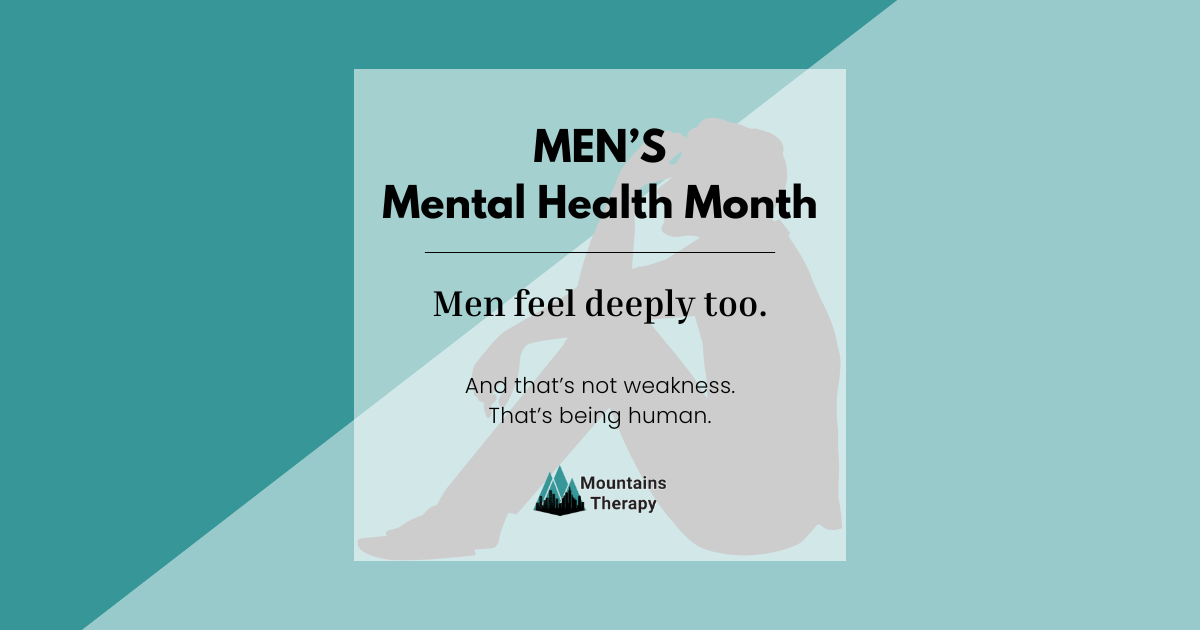Men’s Mental Health Awareness Month: Breaking Stigma and Saving Lives
Learn more about Individual Mens Therapy.
In This Blog, You’ll Learn:
✅
What mens mental health is and how it affects daily life
✅ Types or signs of mens mental health struggles
✅
Myths vs. facts about mens mental health
✅
Coping skills for mens mental health
✅
How therapy helps with mens mental health
✅
Where to find the best therapy for mens mental health near you
What Is Men’s Mental Health and Why Does It Matter?
June is recognized as Mens Mental Health Awareness Month. It's a time to shine a light on the emotional well-being of men and to challenge the silence that often surrounds it. Mens mental health is about more than diagnosing conditions, it’s about helping men live fuller, more connected, and emotionally balanced lives.
Men are statistically less likely to seek help for mental health challenges. Which is why raising awareness during Mens Mental Health Month is not just important, it is lifesaving. Many men feel isolated when it comes to emotional struggles due to outdated cultural beliefs about masculinity. Without support, emotional pain can manifest as anger, withdrawal, workaholism, or even physical symptoms. Addressing mens mental health helps improve relationships, resilience, and overall life satisfaction.
What Are the Mental Health Conditions for Men?
Men can experience all the same mental health conditions as women, though symptoms may often show up differently or go unrecognized. In many cases, men may not recognize emotional struggles for what they are and instead present with physical symptoms, irritability, anger, or disengagement. In addition, men may be more likely to cope with distress through substance use or risky behaviors, which can mask underlying mental health issues.
What Are the 5 Most Common Mental Health Disorders for Men?
1. Depression
- While women often report sadness, men may show depression through irritability, fatigue, loss of interest in activities, anger, or difficulty concentrating.
- Men with depression may also be more likely to engage in substance use or risky behaviors.
- Learn more about therapy for men with depression.
2. Anxiety
- Men may experience generalized anxiety, panic attacks, or social anxiety, but may be less likely to discuss feelings of fear or worry.
- Instead, anxiety may present as irritability, tension, difficulty sleeping, or somatic complaints (headaches, stomach issues).
- Learn more about therapy for men with anxiety near me.
3. Alcohol Use and Substance Use Disorders
- Men are significantly more likely than women to engage in problematic use of alcohol, marijuana, and illicit drugs.
- Substance use is often an attempt to self-medicate underlying distress, trauma, or unresolved emotions.
- Learn more about therapy for men with depression near me.
4. Post-Traumatic Stress Disorder (PTSD)
- Men exposed to trauma (combat, accidents, violence, or childhood adversity) may experience intrusive memories, hypervigilance, emotional numbness, and anger outbursts, sometimes without recognizing these symptoms as PTSD.
- Learn more about therapy for men with PTSD near me.
5. Suicidal thoughts and behaviors
- Men account for nearly four 4 of 5 suicides in the United States.
- Suicide is the seventh leading cause of death for men.
- Men are nearly four times more likely to die by suicide than women.
- Suicide is a silent crisis in men’s mental health.
- Learn more about therapy for men with suicidal thoughts near me.
Mens Suicide is Preventable
Too many men suffer in silence, believing they must be “strong” or handle things alone. This stigma prevents men from speaking up about depression, anxiety, trauma, and emotional pain, all of which are treatable with the right support. Early intervention, compassionate conversations, and access to therapy can save lives.
During Mens Mental Health Month, let’s commit to breaking the silence:
- Talk openly about suicide prevention.
- Check in on the men in your life.
- Share resources.
- Remind men that it is okay to seek help.
- Encourage therapy as a brave and healthy choice.
Get Men Help — Suicide Prevention Resources
If you or someone you know is struggling with thoughts of suicide or severe emotional distress, help is available. You are not alone, and support is always within reach. Here are trusted, confidential resources you can turn to:
- 988 Suicide & Crisis Lifeline — Call or text 988, available 24/7, free and confidential.
- Veterans Crisis Line — Call 988 then press 1, or text 838255.
- Crisis Text Line — Text HOME to 741741 to connect with a trained crisis counselor, available 24/7.
- National Alliance on Mental Illness (NAMI) HelpLine — Call 1-800-950-NAMI (6264) or text "HelpLine" to 62640.
Remember: If you or someone you love is in immediate danger, call 911 or go to the nearest emergency room.
What Is the Stigma Behind Men's Mental Health?
Despite growing awareness, stigma remains a major barrier to mens mental health care. Common myths and facts include:
Myth: Men should be strong and handle problems alone.
✅ Fact: Emotional expression and seeking support are signs of strength, not weakness.
Myth: Therapy is only for “serious” mental illness.
✅ Fact: Therapy can help anyone live a healthier, more fulfilling life.
Myth: Talking about feelings makes things worse.
✅ Fact: Talking openly often brings relief and leads to meaningful change.
Myth: Real men don’t get depressed.
✅ Fact: Depression affects people of all genders, including men.
Myth: Men should “man up” rather than seek help.
✅ Fact: A man in therapy asking for help is a courageous step toward healing.
How to Cope With Men’s Mental Health Challenges
- Normalize talking about emotions with trusted friends or a therapist — regular open conversations can reduce feelings of isolation and shame.
- Practice regular physical activity to boost mood — even short walks, weightlifting, sports, or outdoor activities can release mood-enhancing endorphins.
- Engage in hobbies that bring joy and connection — whether it’s music, art, woodworking, gaming, car restoration, or volunteering, finding personal outlets supports well-being.
- Practice mindfulness or grounding techniques — try guided meditation, breathwork, yoga, or body scans to calm racing thoughts and stay present.
- Limit alcohol or substance use — substances often worsen symptoms of depression and anxiety and can increase impulsivity, including suicidal thoughts.
- Build a strong support system — cultivate friendships and connections with people who value emotional honesty and offer encouragement.
- Prioritize rest and self-care — aim for regular sleep, healthy nutrition, hydration, and downtime for recovery and balance.
- Challenge perfectionism and unrealistic expectations — give yourself permission to not have all the answers and to make mistakes.
- Engage in therapy even if things “don’t seem that bad” — therapy helps prevent small struggles from becoming overwhelming.
- Practice stress-reduction techniques such as progressive muscle relaxation, nature walks, journaling, or creative expression.
- Educate yourself about mens mental health through books, podcasts, or workshops — awareness reduces stigma and empowers healthier choices.
- Know when to ask for professional help — if symptoms persist, worsen, or interfere with work, relationships, or daily life, reach out to a qualified therapist.
How Therapy Helps With Men’s Mental Health
At Mountains Therapy in Montclair, NJ, we recognize the unique needs of men seeking mental health support.We understand that men often face cultural expectations to be stoic, strong, and self-reliant, which can make reaching out for help feel difficult or shameful. Our therapists are experienced in helping men work through these barriers and create a therapeutic space where they can be open without fear of judgment.
Therapy offers men the opportunity to:
- Understand and name their emotions
- Learn healthier ways to cope with stress and frustration
- Reconnect with loved ones through more effective communication
- Address trauma or difficult life experiences
- Reduce reliance on substances or other harmful coping behaviors
- Improve sleep, focus, and energy
- Build emotional resilience and self-confidence
What Therapy Helps With Men’s Mental Health at Mountains Therapy
We offer evidence-based approaches to support mens mental health, including:
- Acceptance and Commitment Therapy (ACT) — Helps men clarify their core values and take meaningful actions, even in the face of difficult thoughts and emotions.
- Attachment-Based Therapy — Supports men in understanding how early relationships impact current connections and helps foster secure, healthy relationships.
- Cognitive Behavioral Therapy (CBT) — Focuses on identifying and changing unhelpful thought patterns and behaviors that contribute to stress, anxiety, and depression.
- Dialectical Behavior Therapy (DBT) — Teaches practical skills for managing intense emotions, improving relationships, and building resilience.
- Emotionally Focused Therapy (EFT) — Strengthens emotional bonds and helps men create more secure, fulfilling relationships with partners, family, and friends.
- Mindfulness-Based Therapy — Builds present-moment awareness and helps men manage stress, reduce anxiety, and improve overall well-being.
- Narrative Therapy — Encourages men to explore and reshape the stories they tell about themselves, fostering empowerment and personal growth.
- Psychodynamic Therapy — Helps men gain deeper insight into unconscious patterns that influence their emotions, behaviors, and relationships.
- Solution-Focused Therapy (SFT) — Emphasizes men’s existing strengths and resources to create practical, positive changes in daily life.
- Trauma-Focused Cognitive Behavioral Therapy (TF-CBT) — Provides targeted support for healing from trauma and building healthy coping strategies.
FAQs About Men’s Mental Health
- How do you help a man who is struggling with his mental health?
- Offer compassionate, nonjudgmental listening.
- Encourage him to talk openly about what he’s feeling.
- Share resources like mens mental health quotes that inspire hope.
- Normalize therapy as a healthy, empowering choice, and support him in connecting with a qualified therapist who understands mens mental health concerns.
- Why are men less likely to seek mental health support?
- Many men face cultural messages that discourage emotional expression or asking for help.
- Fear of appearing weak or being judged often prevents men from seeking therapy, which is why spreading awareness during Mens Mental Health Month is so important.
- What signs might indicate a man is struggling with his mental health?
- Changes in mood, irritability, withdrawal from relationships, difficulty concentrating, changes in sleep or appetite, increased substance use, or talk of hopelessness or feeling like a burden can all be warning signs.
- If you notice these, encourage him to seek support.
- Is therapy really effective for men?
- Yes. Therapy provides a safe, supportive space for men to explore their emotions, develop healthier coping strategies, heal from past experiences, and improve relationships.
- At Mountains Therapy, we offer approaches tailored to men’s unique needs.
You Are Not Alone!
Mens Mental Health Awareness Month is the perfect reminder that seeking help is a sign of courage — not weakness. You don’t have to carry this alone. Whether you’re feeling anxious, overwhelmed, or unsure where to start, Mountains Therapy is here for you. Reach out us today to connect with a therapist who truly understands what you're going through.














